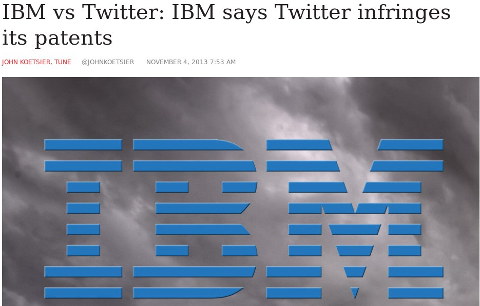When so-called 'cross-licensing' with patent purchases (the latest Microsoft method) is actually a disguise/cover for patent settlement after extortion [1, 2, 3, 4]

Summary: The patent lust at IBM, which is suing if not just shaking down companies using software patents, earns plenty of puff pieces from the corporate media
THE notion that the greater the number of patents, the better -- a notion so ludicrous that also fails to recognise the raison d'être of patents -- is quite a disease. Some people would have us believe that because China created a patents production line in SIPO it's actually at a position of advantage. It's false and it's rather infantile to repeat such claims.
One
new article, seemingly from an author who is not a fan of software patents (see the short part about it), says today that:
The best ratios I found (i.e., most patents per person) were in very rich Bedford, adjoining Manchester, and almost-as-rich Hollis, adjoining Nashua. Each town had slightly more than 2.7 patents per 1,000 people.
[...]
So keep that in mind when you hear people pointing to patent numbers as a reflection of the braininess of a community, state or country or a company or industry. Take it with a grain of salt.
It's often just a reflection of which companies are based around that area. But some towns take it out of context and equate patents with innovation or wisdom. The above article came just shortly after a heap of IBM puff pieces. IBM, as our readers are probably aware of by now, bets its future and the whole farm -- so to speak -- on being more like a patent troll (patent enforcement and shakedown). It has already done that to Twitter, a much smaller company, and it
keeps doing that to other Internet companies. "IBM scores a record 8,000 patents in 2016," enthusiastically
screams this headline from Dean Takahashi (or his editor), who just repeated the 'official' story as follows:
IBM has proven it is once again dominant in earning patents, as it closed the year with 8,088 U.S. patents granted to its investors in 2016. That’s the 24th consecutive year that the company has earned the most patents of any company.
The second-ranked company, Samsung, had 5,518 U.S. patents granted. About 2,700 of IBM’s 2016 patents covered inventions related to artificial intelligence, cognitive computing, and cloud computing. The patents covered a diverse range of technologies that also included cybersecurity and cognitive health.
We have compiled a list of nearly 20 'news' articles [
1,
2,
3,
4,
5,
6,
7,
8,
9,
10,
11,
12,
13,
14,
15,
16,
17] about IBM claiming 8,000 so-called 'inventions' in a single year. Almost all these articles are from yesterday and they add no new information; they're puff pieces void of any analysis. IBM got many of these patents probably by just calling old stuff "cloud" and "AI" (buzzwords). Is "AI" the new "on a machine"? And "cloud" the new "over the Internet"? When it comes to bamboozling patent examiners (so as to be granted software patents) there are all sorts of tricks, many of which boil down to semantics. IBM is nowadays firing
a lot of employees, selling large portions of its
physical products divisions to China (notably Lenovo). Is this the future of IBM then? Just 'hiring' patents, which it
already uses to attack and extort far smaller companies?
"Samsung Second & Google Fifth In 2016 Patent Race", an Android news site said yesterday, so IBM isn't alone among Linux-oriented firms when it comes to the patents gold rush. Samsung and Google, however, are
not patent aggressors. Unlike the above IBM puff pieces, a writer in
Fortune published
"These Firms Won the Most Patents in 2016" -- a list that shows Microsoft falling down quite sharply. As a Microsoft propaganda site
puts it, "Microsoft ranked 8th on the list of companies awarded with most patents in the US" (a lot lower than before).
Well, Microsoft is having issues. Software patents are getting more difficult to get, so it is not managing to keep up with patent filings.
Financial issues are not helping either. In the coming years we expect IBM to become more and more like a patent troll whose actual products (if not jobs too) sailed away to China.
⬆

